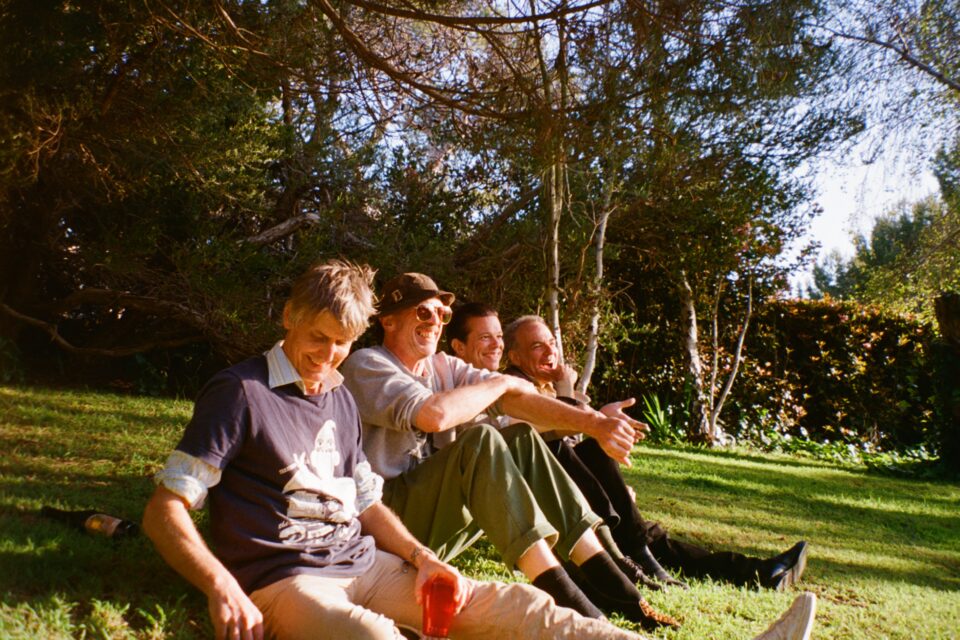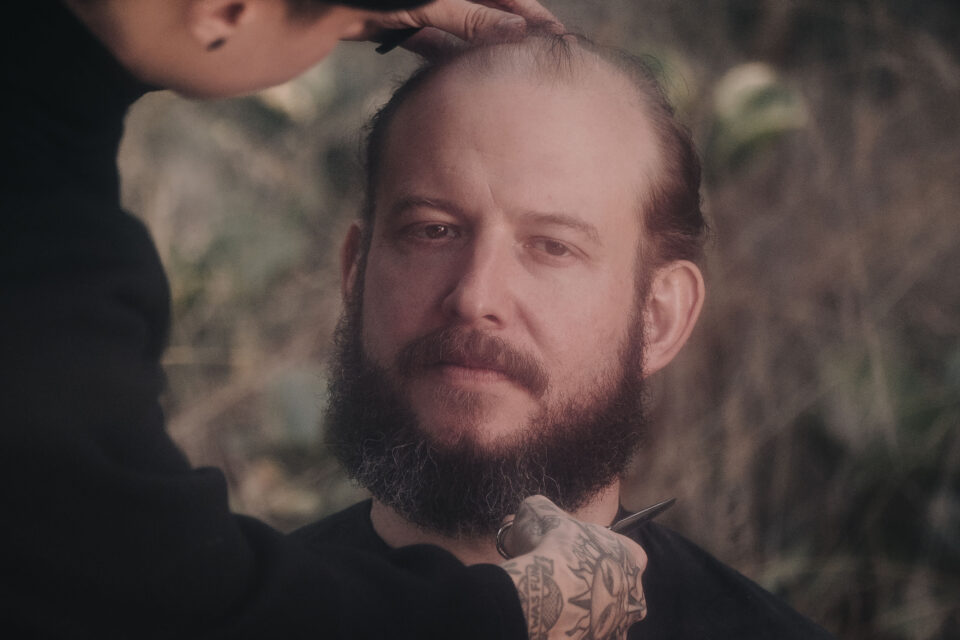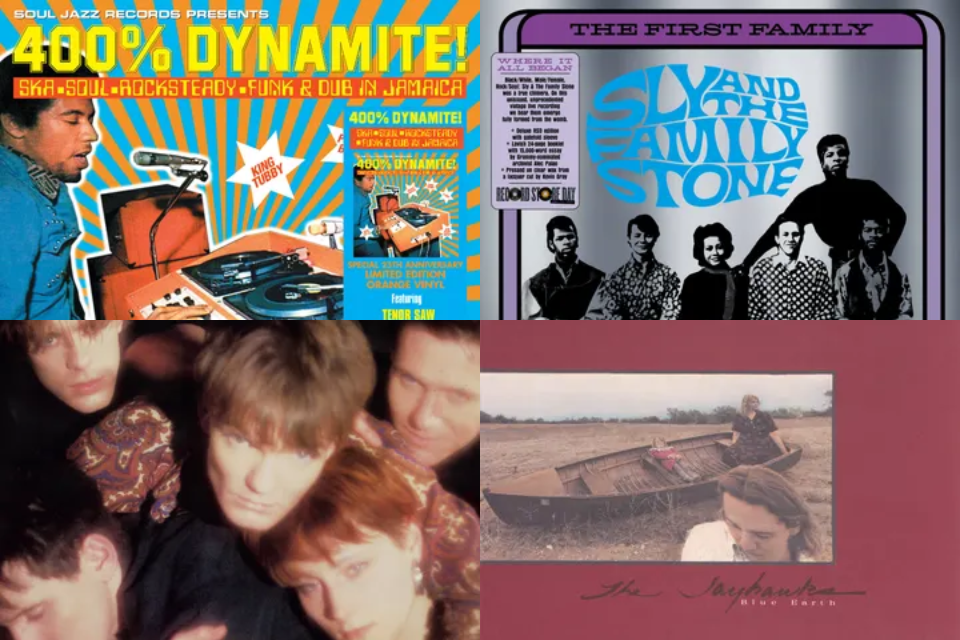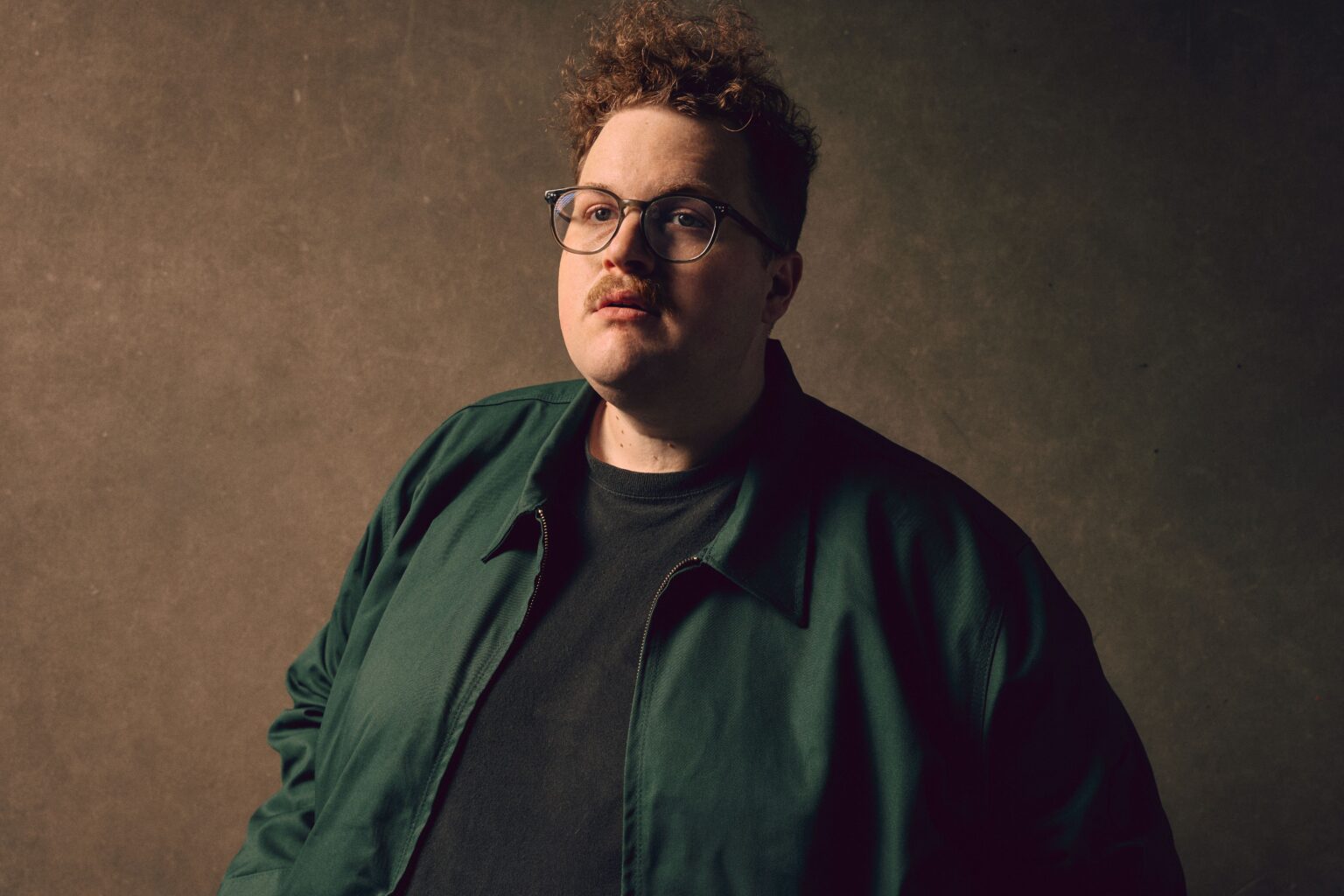“When we’re together everything feels good, it’s safe to be dangerous…I can speak from experience and say that is pretty rare.” Matt Sweeney is straightforward and unaffected but wholly sincere in his praise for his bandmates in The Hard Quartet, a technically new four-piece band formed from longtime music-making friends who’ve collaborated and crossed paths in different duos, trios and on show bills dating back to the early ’90s. But only now do Sweeney, Emmett Kelly, Stephen Malkmus and Jim White have a band together with a record — The Hard Quartet’s self-titled debut released in October on the Matador label — and with a proper American tour starting in Nashville in March.
A couple of weeks after the album dropped, I spoke with Sweeney and Kelly, who dialed in from different coasts and were equally enthusiastic about this new project and how 15 tracks resulted from their writing sessions last year. Having led their own bands and backed up innumerable notable indie artists over a combined near-century in music, these four guys boast the bona fides to really chill and have fun with this thing, I gathered. This is a contrast from the hustle of being young and thirsty in the business and the requisite grind of making “product” under the influence of “commerce,” to which Kelly alluded.
As a result of the freedom, skill and mutual trust across the band, The Hard Quartet can sonically navigate the hard and the soft. On record they go from improvisational and windy to explosive and taut, contemplative to critical, taking turns singing and ripping solos. What underpins the fun and comfort in jamming with friends and just seeing what happens, though, is the deep honor the bandmates have for one another as creative people.
Kelly and Sweeney spoke to me about the other half of the quartet not present on our call. Describing the mind-boggling and different way that drummer Jim White experiences and seems to comprehend music, Kelly said of White, “I consider him to be one of the great musicians I’ve ever encountered.”
On Stephen Malkmus, Sweeney remarked, “He’s been somebody since I’ve heard his music who’s been writing melodies and lyrics and making recordings that continue to be exciting and relevant.” Kelly chimed in about Malkmus, “He’s transcending language when he is making up lyrics, they’re like coming out of the ether and it’s the most insane thing ever.” Sweeney: “He’s got a gift with language I’ve never seen. Two people I’ve been around with prodigious talent that nobody seems to argue about are Steve and Bob [Pollard] from Guided by Voices. I’ve seen how they both work and Steve’s way is totally different than Bob’s way. I’m in awe of them both. But Steve’s way is really funny because he’s so at peace with and comfortable with himself when he’s coming up with this stuff.”
Hear my full conversation with Kelly and Sweeney, where they elaborate on the “no agenda” way of creating together, here and via WNXP’s podcast channel.
Supergroup origin story
Celia Gregory: When did you know that this could be not just a hang and a jam, but a band and a record? Do you remember that point?
Emmett Kelly: Like 20 minutes into it.
Matt Sweeney: Yeah, I think four years before we got together we all said that we thought it was a good idea. And then pretty much as soon as we got in the room, we were like, “Yeah, this is great.”

Uniqueness of approach
CG: We’re focusing on this record, but you’ve both collaborated with so many folks over history, and I wonder what might be unique about the ways you four have gelled, the way you’ve maybe pushed each other musically or as songwriters and that comes through on these 15 tracks.
EK: I think we all have different kinds of flows and it’s cool to sort of offset each other’s flow a little bit. I generally find myself in projects where there’s kind of a base layer of objective or approach and that’s the theme of the record or of the group. What I like about this is that it is always kind of changing because we all have different approaches. The fact that there are different writers, that base layer changes, which I think is really cool because it really energizes everybody. At least it does for me, when I leave my universe or something inside of a song.
MS: Yeah, well said. I follow what the fuck Emmett is saying. [Emmett laughs.] What’s fun about being in a band where everybody’s down for each other and there isn’t an agenda is…that everybody’s down for each other and there isn’t one person’s agenda. We’ve all played with lots of different people. But generally, if I’m playing with somebody else, we know the objective. Like, if I’m with Mick Jagger, it’s going to be Mick Jagger. I’m supporting Mick Jagger. It’s about Mick Jagger, and it’s about seeing through their thing and maybe adding some color to it. So when you get together with somebody, there is kind of an objective that is sort of understood. That’s different than when you’re in a band [like this]: we all have songs, we’re all going to do stuff. We don’t know how it’s going to end up, but we know that it’s going to end up really cool because we like being here.
EK: We went in there thinking, “I have no idea what’s going to come out of this. I don’t know what we’re doing. I don’t know if we’re making an album. I don’t know if we’re just hanging out and jamming. I don’t know what’s happening.” It’s been interesting describing it to my friends because oftentimes they’ll ask questions like, “What kind of band is it?” For the past I don’t know how long I’ve been kind of anti- that question, you know what I mean? Because I don’t know what kind of band it is. It’s four dudes, you know, we have guitars. We can say we’re a rock and roll band or something, and what’s more ambiguous than that? But none of my friends want to handle that. They’re in these post-punk bands or goth bands or country bands or whatever and that’s cool. I’m just psyched at the fact that we seem to have a lot of shared music musical interests [but are not] really too interested in being involved in a scene necessarily. Or identification group or whatever that means.
On Rio of “Rio’s Song”
CG: [To Matt Sweeney] I understand “Rio’s Song” is about a friend that’s no longer with us that inspired that song. Can you tell a story about Rio?
MS: Once when he was dressed up as Jesus on Halloween, he was a bar owner, and somebody had attacked somebody in the bar. And so it was left to Rio to get the guy out on the streets and when. And the guy kind of kept on rushing at Rio and so Rio had to disable him, had to dispatch him with with his fists and feet, dressed entirely as Jesus. Somebody said, “Jesus, you’re killing him! You gotta stop!” [Laughter.]
CG: That was so at the ready for you. I’m sure there’s loads more.
MS: I don’t think I’ve ever told that story, but yeah, that one just popped into my head.
“Six Deaf Rats”
CG: Is there a song that might never be a single from this record but you’re partial to, especially as you’ve done a few shows now and you’re preparing for a bigger tour?
EK: I’ve always been really partial to “Six Deaf Rats” just because it’s got a really improvised kind of quality to it. We did it a handful of times, but it seemed like the objective wasn’t to, like, fully learn it, for lack of a better word. And now that we’re playing it on a regular basis, it grows in its own kind of interesting, natural way. And because of the foundation being, like, trying not to figure it out completely because it’ll grow…I love that style of play.
MS: Yeah, that one’s been definitely fun to play and is probably too long to be a single. But I would I concur with that, that one has shown itself to be pretty fun and shapeshift-y in a cool way.
Kelly’s return to collaborative songwriting
CG: I believe you, Matt, said, with the release of “Our Hometown Boy” [one of the two songs on the LP sung by Kelly], “It’s fucked up how good” he is at music. Emmett, care to respond and/or explain a little bit more about that song?
EK: I mean, that’s totally flattering to hear that. But I’ve been in this weird kind of anti-production mode for a long time. It’s hard to describe, but it’s cool to, like, write songs again because there are some friends who are like, “Let’s write some songs…because it’s fun.” There’s been this weird part of me over the past five or so years that’s kind of confused at the idea of making product. You know what I mean? I don’t know what the song is about necessarily. It’s like a weird song, but it was fun to make it, and it was like breaking loose some weird personal wormhole that I was in. To make that one was sort of, “Come on, dude, write a song again.” This is all part of getting inside of your own personal echo chamber of, like, being a leader of a group or a solo act or whatever the fuck it is. It’s so much more rewarding for me to work on stuff with other people. Regardless of what the project is like, I don’t want to sit alone in my house and fuck around on my computer.
MS: Me neither! NEVER!
EK: When we did that pandemic thing, some people thrived and they went deeper into this weird personal project. I went the opposite. I was like, “What’s the fucking point of doing this?” So it’s nice returning to being like in a room with your friends who are like, “Dude, that song’s cool. Let’s finish it.”
CG: Feedback?
EK: Feedback, yeah, but also this is a social experience, you know, music is a social experience. And it’s really easy to lose track of some kind of essential purpose behind behind making stuff when you’re in a weird world of commerce, you know what I mean? That’s just a dubious influence on things, you know, because it is an influence regardless. But basically it was nice to get into a social experience again with songwriting as opposed to like, you know, just full improvisation or a friend showing up and being like, “Come jam on this thing” or something. [This was] like, “Let’s get down to business here. Let’s have fun here. Let’s enjoy music together.”
Growth potential, no drama nor trauma
MS: With this band it’s really nice because, like Emmett says, you’re getting in the room and we’re all old friends. We’ve all been around each other for so long so the context is there and we don’t really need to have to talk about too much. I definitely feel like we’re all bringing what we have behind us into the room when we walk in, but in a very, very good way… In my music mind, it’s very, very positive when I’m with these guys. I don’t feel like I’m having to check my trauma at the door. It just feels good, you know?
EK: One good thing about music is that musicians’ relationship to it morphs over their lifetime. Music should get better and better as time goes on because your relationship to it becomes more nuanced. And it’s not about the youthful, like, weird success thing, you know? I think about the music I’ve made in the past and…it’s crazy that I thought I could like freeze it or something at that moment. It’s cool that there’s evidence of musical output, but I’ve always want these things to grow.
We are in this cool band right now [where] it seems like we are all on the same wavelength and we are excited at the way that things move, just in a creative sense, in a performative sense. It’s really about that more than anything, you know, because we’re not interested in freezing time.
MS: This is a good group in that way. If I have any agenda with this band, it’s just to get better and to do more stuff. If there was any conscious thought about who, when I wanted to get this band together, it was like “Who do you want to play with that you could grow with, that is going to inspire you to grow?” In this band, it’s cool I get to sing again. I can sing and so I’m going to be a better singer. Emmett’s an incredible singer, Steve’s an incredible singer. And with Jim, too, you know, just playing with Jim, I always feel like I learn something. That’s maybe a thing that I think about looking forward with this band: I’m going to get better in the light of these guys.




